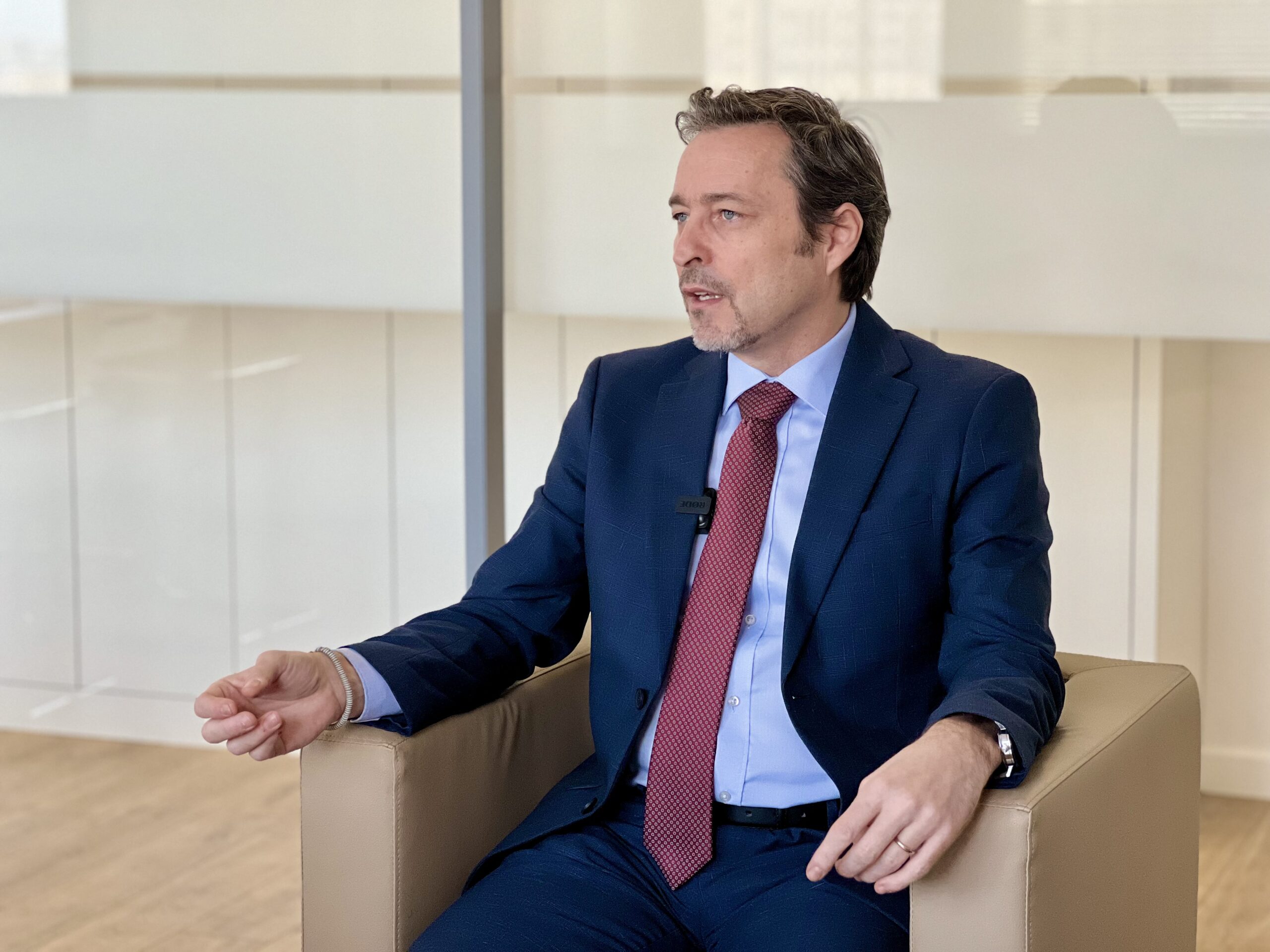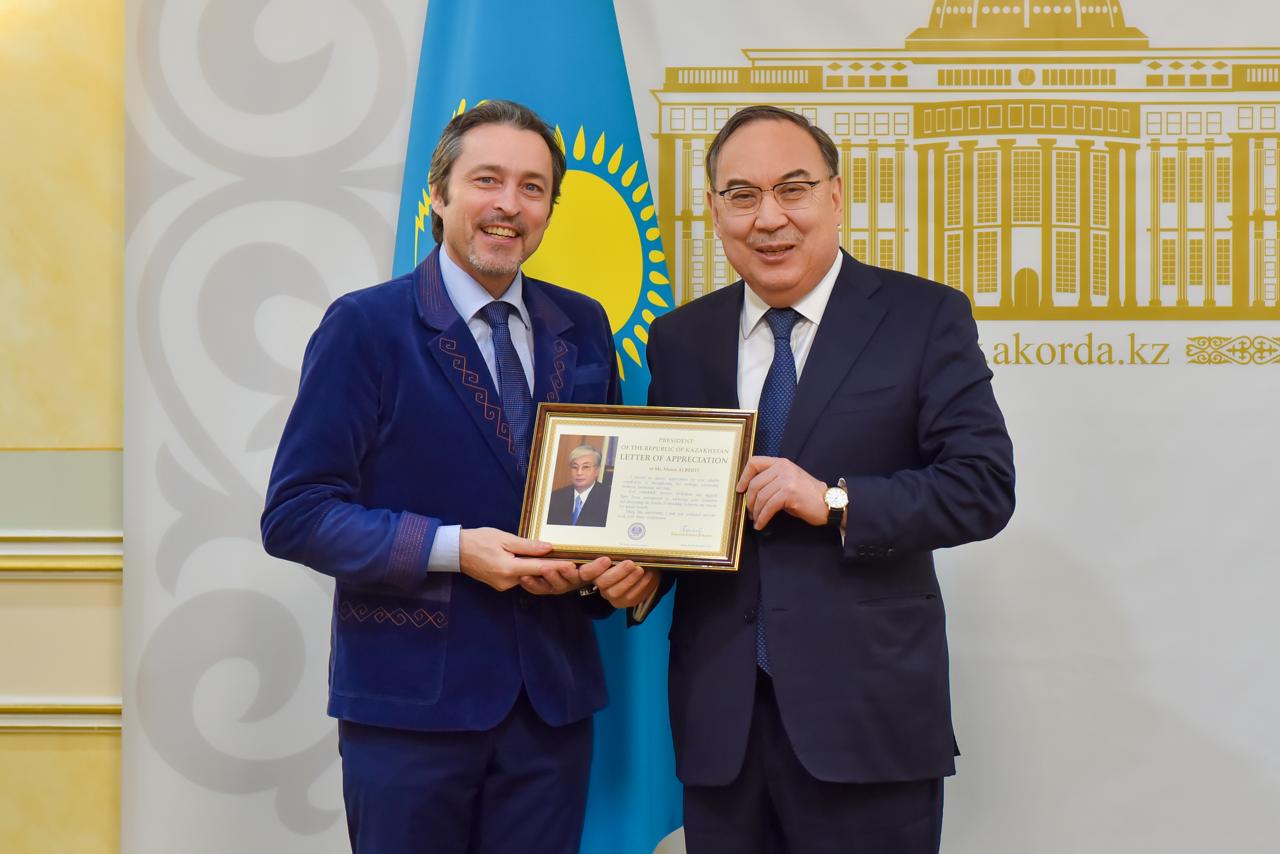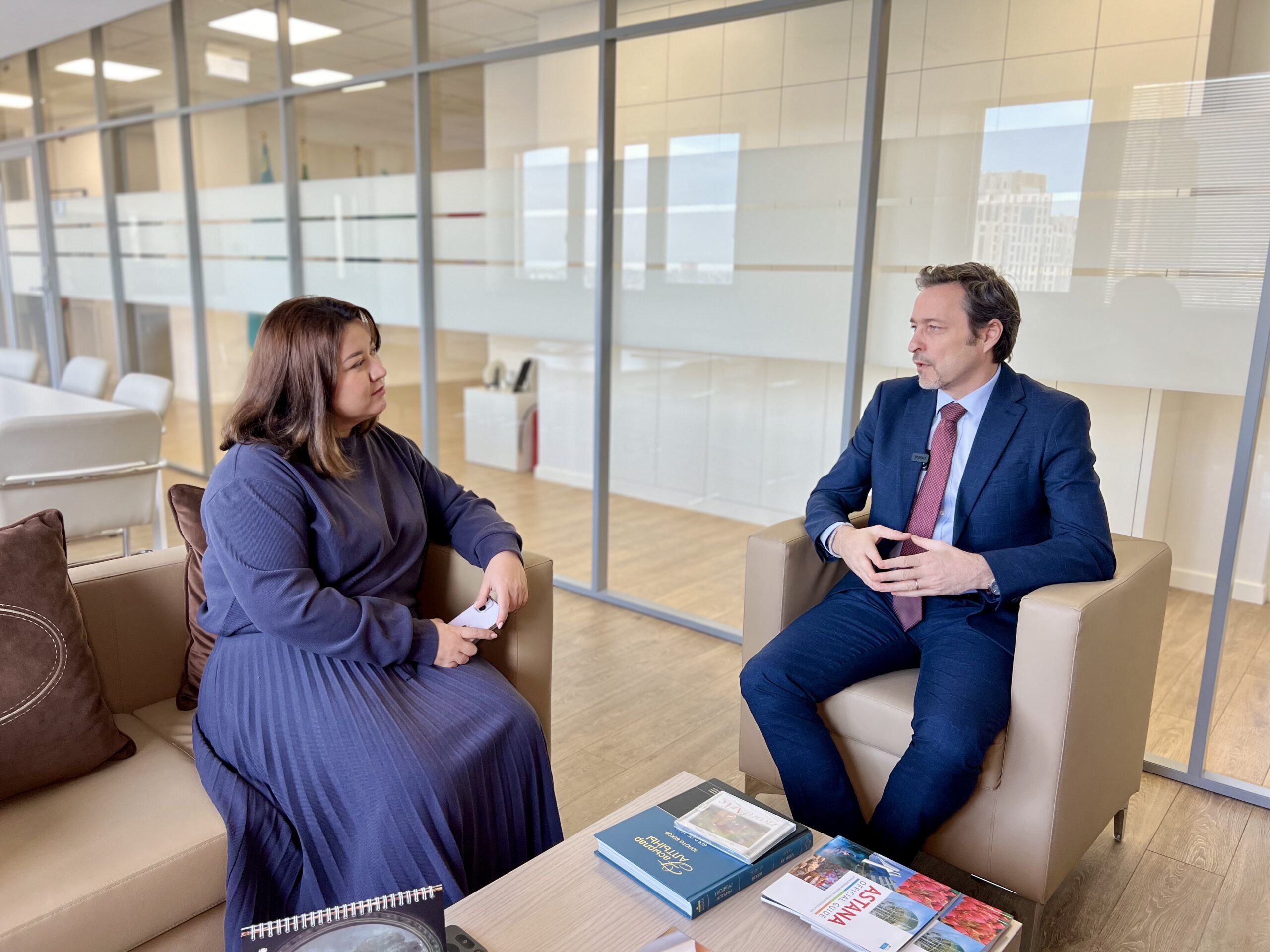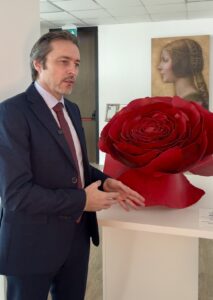ASTANA—Marco Alberti, the Ambassador of Italy to Kazakhstan and the Kyrgyz Republic, reflected on his transformative three-year tenure in Kazakhstan in an exclusive interview with The Astana Times. He emphasized the two nations’ creative synergy and deepening economic and cultural ties. As his time in Kazakhstan draws to a close, Alberti offers insights into the lessons he has learned and his vision for the future of Italian-Kazakh relations.

Italy is still Kazakhstan’s third global commercial partner and the number one in Europe, said Alberti. Photo credit: The Astana Times
Economic and cultural ties flourish
Over the past three and a half years, Italy and Kazakhstan have achieved significant milestones in their bilateral relations, particularly in trade and cultural exchange.
“Italy is still Kazakhstan’s third global commercial partner and the number one in Europe. The trade turnover significantly soared by 40-45% over the last years, with exports of Made in Italy almost doubled. Besides, we remain the largest importer of Kazakh goods,” Alberti said.
The Italian Ambassador emphasized that Italy’s approach to enhancing bilateral relations was crafted by three strategic drivers: diversification, complementarity, and innovation.
“Diversification was, is and will always be essential for our cooperation. Historically, the Italian presence in Kazakhstan has been focused on oil and gas. Good, but not enough. We aimed to expand our presence into different industries, like petrochemicals, agribusiness, tourism, creative industries and renewable energies, to accompany Kazakhstan towards its full decarbonization. I have seen Italy and Kazakhstan working hard to transform their excellent bilateral relations into a partnership. To that purpose, President’s Tokayev’s visit to Rome in January ‘24 was a real boost,” he said.

Yerzhan Kazykhan Assistant to the President for external affairs presented Alberti with Letter of Gratitude from President Tokayev on Dec. 12 Photo credit: gov.kz
The second driver, complementarity, was developed to highlight the strengths of both countries.
“Kazakhstan is a vast country, and we are a small one. You have massive natural resources, while Italy can offer cutting-edge technologies. You have large companies. At the same time, 95% of Italy’s GDP is generated by small and medium-sized businesses. If strategically managed, this diversity can bring additional value,” he said.
Innovation rounded out Alberti’s approach, with Italy adopting new methods to boost exports and build stronger connections.
“Innovation means putting creativity to work. We can do new things or the same things in a new way. In both cases, solid cooperation with public and private partners, Italian and Kazakh, is necessary to build up future-proof relations. Innovation requires the creative energy and resources of the private sector as well as the strong support of the public sector. We have new Italian players in Kazakhstan: the Italian Cultural Institute in Almaty, for example, or Confindustria Kazakhstan, the local subsidiary of the major association of Italian companies. On the other hand, the Kazakh government opened this year a new Kazakh Invest office in Milan, to work with small and medium sized businesses, increase trade turnover and attract new investments to the country,” he added.
Alberti noted that cultural promotion often intersects with business.
“Cultural promotion fosters open dialogue, friendship and peace but also contributes to business and competitiveness. First, because societal norms, values, and traditions shape entrepreneurship. Different cultures have unique approaches to business, which must be known. Furthermore, cultural promotion generates a positive influence that facilitates business opportunities. Several initiatives of our programs were designed in cooperation with Kazakh partners to promote Italian culture and, simultaneously, to enhance visibility in Kazakhstan,” he said.
“In 2022, along with Kazakh Tourism, we invited an Italian solo piano artist to play inside the Charyn Canyon: we were promoting Italian music while shedding light on one of Kazakhstan’s most popular tourist destinations. The exhibition of La Bella Principessa by Leonardo da Vinci was a strong promotion of Italian culture, but it also positively impacted Astana. Working this way helps me face a critical challenge: navigating new cross-cultural interactions. Some 28,000 visas, of which 2,000 were issued to Kazakh students, in 2024 prove that bilateral relations are growing at every level. A lot has been done, but there is still much to do!” he added.
A nomadic reflection: lessons learned
As his tenure comes to an end, Alberti reflected on the bittersweet nature of being a diplomat.
“Diplomats are nomads. With its nomadic culture, Kazakhstan taught me the importance of cherishing every moment of our lives. We know we will stay for a while, and we know that we will have to leave someday. Being aware that you have limited time pushes you to value every second of your life and invest more deeply in the present,” he added.
Alberti described feeling both happy and sad as he prepares to leave.
“I did my best to offer Kazakhstan the best of Italy. What we achieved, thanks to the great team of the embassy and many Kazakh partners, makes me happy. Yet, I am also sad. The sadness of leaving is somehow positive: it reminds me of the privilege of serving in Kazakhstan at this particular time in history while the country is going through a deep modernization process. Every circumstance has been rewarding, including the difficult ones,” he said.
“Kazakhstan taught me to be perseverant and to value the truth of the saying: ‘The same boiling water that softens the potato hardens the egg. It’s not about where you are, but who you are,” he added.
“Kazakhstan in 10 Words”: a unique perspective
Alberti’s experiences have inspired him to write a book titled “Kazakhstan in 10 Words”, capturing his insights and reflections.
“I believe that if you have a great experience, you must tell it everyone. Sharing knowledge, perceptions, feelings, enriches both yourself and those who listen to your story. The book is built around ten words, each of them capturing the essence of the experience I lived in Kazakhstan,” he said.

Marco Alberti, the Ambassador of Italy to Kazakhstan with Aida Haidar. Photo credit: The Astana Times
The concept of the book is collaborative and personal.
“I asked some Kazakh friends to suggest some words that represent their country. Then, I immersed myself in those concepts, by living a real experience linked to the word. Finally, I turned those feelings into written words,” he explained.
Written entirely during working flights across Kazakhstan, the book is concise—50 to 60 pages long—and designed to be read in the time it takes to travel between the country’s cities.
“Life is a journey, and traveling is the essence of our lives, especially if we are nomad by profession, like diplomats are. We have a container, not a yurt. We move by plane, not on horseback. But we are travelers, and the idea was writing a book while traveling,” he said.
One of the keywords in the book is “woman.” Alberti highlighted the pivotal role of women in Kazakhstan’s modernization.
“One of the driving forces of the new Kazakhstan are women. I met very talented women here. Their potential, still partially untapped, is a cornerstone of the country’s future,” he said.
“The road is still long, but something is changing, and I am optimistic,” he added.
A culinary and cultural mosaic
Kazakhstan’s hospitality left a lasting impression on Alberti.
“I was positively shocked by the culture of sharing food. In many places, people invite you to share a drink. Instead, here in Kazakhstan, as in Italy, the guest is primarily invited to share food, which has a deep cultural meaning connected to family and hospitality. Food is feeding: you feed your beloved ones, you feed your guests, you feed your relations with friends, colleagues, stakeholders,” he said.
He also marveled at Kazakhstan’s diverse culinary traditions, which mirror its multi-ethnic society.
“A Kazakh dinner reflects unity in diversity. You experience an incredible mix of recipes and flavors, showcasing the country’s rich heritage,” he said.
Bridging cultures through creativity
“Creativity is not only inspiration. It is the ability to find new solutions to solve complex problems, whatever we do. As the complexity of society grows, creativity becomes a key driver for facing and overcoming challenges,” said Alberti, emphasizing how cultural exchange has been a cornerstone of Italy-Kazakhstan relations.

“Rosa Caprice” is a strong symbolic meaning. Like flowers, friendship and international relations must be watered and nurtured daily, said Alberti. Photo credit: The Astana Times
“In Kazakhstan, I discovered an incredible reservoir of talent and ingenuity, reflecting the same creativity and innovative spirit that defines Italy,” he added.
“Kazakh people have the instinct to explore, which I adore. Yet, instinct is not enough: we need to cooperate to turn ideas into projects and projects into tangible results. Tomas Edison once said: ‘The value of an idea lies in the ability of putting it into practice.’ To the same extent, this is the essence of our bilateral cooperation, as I conceived it over these years: in politics, economics, culture or whatever else sector we are committed to, ideas must become projects and projects have to bring results,” he said.
A poignant example is the artwork “Rosa Caprice.” In 2022, to mark the 30th anniversary of diplomatic relations between Italy and Kazakhstan, a symbolic artwork made by the Italian artist Luisa Valentini was unveiled. Initially displayed at the Astana Opera, the rose was later gifted to the Italian Embassy.
“This artwork enshrines a strong symbolic meaning. Having the rose here at the embassy reminds us nothing must be taken for granted. Like flowers, friendship and international relations must be watered and nurtured daily, if we want them to flourish and shine,” he said.
